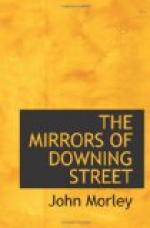I think that the doom that has fallen upon him comes in some measure from the amusement he takes in his mental quickness, and the reliance he is sometimes apt to place upon it. A quick mind may easily be a disorderly mind. Moreover quickness is not one of the great qualities. It is indeed seldom a partner with virtue. Morality appears on the whole to get along better without it. According to Landor, it is the talent most open to suspicion:
Quickness is among the least of the mind’s properties, and belongs to her in almost her lowest state: nay, it doth not abandon her when she is driven from her home, when she is wandering and insane. The mad often retain it; the liar has it; the cheat has it: we find it on the racecourse and at the card-table: education does not give it, and reflection takes away from it.
When we consider what Mr. Lloyd George might have done with the fortunes of humanity we are able to see how great is his distance from the heights of moral grandeur.
He entered the war with genuine passion. He swept thousands of hesitating minds into those dreadful furnaces by the force of that passion. From the first no man in the world sounded so ringing a trumpet note of moral indignation and moral aspiration. Examine his earlier speeches and in all of them you will find that his passion to destroy Prussian militarism was his passion to recreate civilization on the foundations of morality and religion. He was Peace with a sword. Germany had not so much attempted to drag mankind back to barbarism as opened a gate through which mankind might march to the promised land. Lord Morley was almost breaking his heart with despair, and to this day regards Great Britain’s entrance into the war as a mistake. Sir Edward Grey was agonizing to avert war; but Mr. Lloyd George was among the first to see this war as the opportunity of a nobler civilization. Destroy German militarism, shatter the Prussian tradition, sweep away dynastic autocracies, and what a world would result for labouring humanity!
This was 1914. But soon after the great struggle had begun the note changed. Hatred of Germany and fear for our Allies’ steadfastness occupied the foremost place in his mind. Victory was the objective and his definition of victory was borrowed from the prize-ring. A better world had to wait. He became more and more reckless. There was a time when his indignation against Lord Kitchener was almost uncontrollable. For Mr. Asquith he never entertained this violent feeling, but gradually lost patience with him, and only decided that he must go when procrastination appeared to jeopardize “a knock-out blow.”




